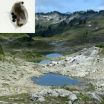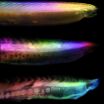(Press-News.org) Some tiny crustaceans living in clear-water alpine ponds high in Washington state's Olympic Mountains have learned how to cope with the sun's damaging ultraviolet rays without sunblock – and with very little natural pigmentation to protect them.
In fact, in laboratory tests these water fleas, about the size of fruit flies, withstood UV rays much better than the same species of flea taken from a pond less than a mile away, where the water was murkier and thus offered protection.
"The ponds pretty much look the same to us, but the environments are very different for the animals that live there," said Brooks Miner, a University of Washington doctoral student in biology, whose findings are published Oct. 13 in the online edition of the United Kingdom's Proceedings of the Royal Society B. Coauthor is Benjamin Kerr, a UW assistant professor of biology and Miner's doctoral adviser.
"Through their behavior, the Daphnia in the darker ponds can choose a deeper environment where there is no ultraviolet radiation, but the animals in the clear ponds don't have that choice," he said.
Miner conducted field sampling of water and zooplankton from several ponds at 4,200 to 4,800 feet of elevation in the Seven Lakes Basin of Olympic National Park. The samples were gathered from July through September in 2006 through 2009, after winter snow had melted and the water was beginning to warm enough for zooplankton such as the species Daphnia melanica to survive.
Daphnia from ponds below the tree line were protected from the sun because the water was made darker when surrounding vegetation fell into the water, starting a process similar to what happens in a steeping cup of tea. Water in ponds above the tree line was nearly crystal clear, Miner said, so the fleas there did not receive the same protection from the surrounding water. When the fleas were subjected to UV light in the laboratory, those from the clear ponds survived the best.
The biggest surprise, Miner said, was that the water fleas had very little melanin, a protective pigment found in most animals. He noted that fleas from other habitats that have melanin grow at a slower rate than those without it, so the water fleas in the Olympic Mountains apparently evolved less-costly means to deal with UV radiation.
"It could be that they evolved to use other strategies because the ultraviolet isn't as intense here," he said.
Miner sampled some ponds with very clear water that had no Daphnia at all. That, he suggested, could have resulted because UV radiation in those ponds was too intense.
The next phase of his research, part of his doctoral thesis, will examine whether populations that are exposed to high levels of UV radiation but lack melanin have better-developed systems to repair damage to their DNA.
The work, funded in part by the National Science Foundation, will help in understanding how different populations adapt to UV radiation exposure, Miner said. It also could be instrumental in understanding how to maintain the health of aquatic ecosystems in the face of increasing human population and climate change.
INFORMATION:
For more information, contact Miner at 206-221-7026 or miner@uw.edu.
Forget the Coppertone: Water fleas in mountain ponds can handle UV rays
2010-10-13
ELSE PRESS RELEASES FROM THIS DATE:
Fox Chase researchers uncover Achilles' heel in aggressive breast tumors
2010-10-13
PHILADELPHIA (October 12, 2010)—In an unexpected twist, Fox Chase Cancer Center researchers find that the loss of a single protein, Nedd9, initially slows cancer formation but then makes the tumors that do arise more aggressive. The good news, though, is that the lack of Nedd9 also makes the aggressive tumors more sensitive to a class of drugs that are already used in the clinic.
"If a tumor is able to overcome the loss of this protein, this clearly makes it undergo complicated changes that ultimately select for a more aggressive tumor," says Erica A. Golemis, Ph.D., ...
Promising drug candidate reverses age-related memory loss in mice
2010-10-13
Researchers at the University of Edinburgh today report a new experimental compound that can improve memory and cognitive function in ageing mice. The compound is being investigated with a view to developing a drug that could slow the natural decline in memory associated with ageing.
With support from a Wellcome Trust Seeding Drug Discovery award, the team has identified a preclinical candidate that they hope to take into human trials within a year.
Many people find they become more forgetful as they get older and we generally accept it as a natural part of the ageing ...
Patients and doctors are being misled by published data on medicines
2010-10-13
The drug reboxetine is, overall, an ineffective and potentially harmful antidepressant, according to a comprehensive study of the evidence published on bmj.com today.
The study also shows that nearly three quarters of the data on patients who took part in trials of reboxetine were not published until now, and that the published data on the drug overestimate the benefits and underestimate the harms of treatment - all underlining the urgent need for mandatory publication of all clinical trial results.
Reboxetine has been approved for the treatment of major depressive ...
Are patient surveys a reliable way to assess the performance of doctors and practices?
2010-10-13
To assess the performance of general practices, it is better to ask patients about their actual experiences of care rather than ask for satisfaction ratings, according to new research published on bmj.com today.
The findings call into question the reliability of using surveys to evaluate practice performance.
Patient surveys are used to assess the performance of doctors and practices, and they increasingly enquire about specific patient experiences (e.g. waiting time for an appointment) as well as overall satisfaction.
In the UK, general practices receive some of ...
Long-lasting mechanical heart implanted for the first time in Canada in heart-failure patient
2010-10-13
In a Canadian first, the Peter Munk Cardiac Centre used a new kind of left ventricular assist device (LVAD) to treat a patient with advanced heart failure. The new device is longer lasting than older generation LVADs and may eliminate the need for a second LVAD – a major drawback with the old technology.
The patient, 61-year-old Marva Lorde of Mississauga, suffered a heart attack in 2007 and underwent several treatments for heart failure – including a 10-day intensive care unit stay, angioplasty and pacemaker implantation –culminating in a cardiac arrest in June 2008.
"I ...
Georgia Tech mobile phone game trains players to make healthier diet selections
2010-10-13
With Halloween and the holiday season fast approaching, many people will be watching their waistlines as they're tempted by a cornucopia of sugary and savory foods. Meanwhile a Georgia Tech College of Computing Ph.D. candidate has shown that playing health-related video games on a mobile device can help adults learn to live more healthfully by making smart diet choices. The finding is published in the paper, "Let's Play! Mobile Health Games for Adults," recently presented at Ubicomp 2010 in Copenhagen, Denmark.
OrderUP! is a different take on the recent trend of health-related ...
Rotten experiments help to create picture of our early ancestors
2010-10-13
An innovative experiment at the University of Leicester that involved studying rotting fish has helped to create a clearer picture of what our early ancestors would have looked like.
The scientists wanted to examine the decaying process in order to understand the decomposition of soft-body parts in fish. This in turn will help them reconstruct an image of creatures that existed 500 million years ago.
Their findings have been published today, Wednesday 13th October, in the journal Proceedings of the Royal Society B. The work was funded by the Natural Environment Research ...
Traditional health practices popular among older people who choose not to have flu vaccine
2010-10-13
Eating steamed pears, having a soothing massage or bathing in a herbal mixture are just some of indigenous health practices used by older people to ward off or treat influenza, according to research published in the October issue of the Journal of Advanced Nursing.
Other traditional measures discovered by nurse researchers at the Hong Kong Polytechnic University included being rubbed with a coin, eating cheese, yoghurt and honey and having warm drinks made with ginger or lemon.
The team surveyed nine countries to find out why so many of them were failing to meet the ...
Benefits of planting winter canola examined
2010-10-13
Winter canola might soon be the crop of choice for Pacific Northwest farmers, thanks to research by U.S. Department of Agriculture (USDA) scientists and their partners. The multitasking annual plant can be used to control weeds, supplement animal feed, produce biodiesel--and spark a new revenue stream for the Colville Confederated Tribes.
Frank Young, an agronomist with USDA's Agricultural Research Service (ARS), was part of a team that evaluated production protocols for winter canola in the Pacific Northwest. ARS is USDA's principal intramural scientific research agency. ...
Ancient animal urine provides insight into climate change
2010-10-13
Scientists at the University of Leicester are using an unusual resource to investigate ancient climates– prehistoric animal urine.
The animal in question is the rock hyrax, a common species in countries such as Namibia and Botswana. They look like large guinea pigs but are actually related to the elephant. Hyraxes use specific locations as communal toilets, some of which have been used by generations of animals for thousands of years. The urine crystallises and builds up in stratified accumulations known as 'middens', providing a previously untapped resource for studying ...



